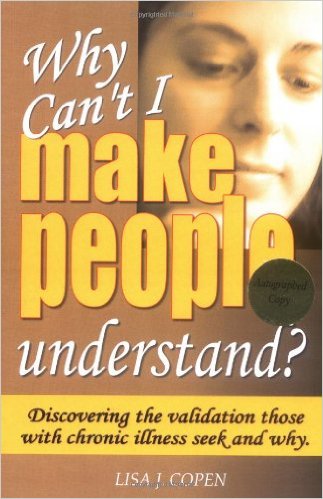When Comments about Your Health 'Sting'
Lisa Copen, founder of Rest Ministries, knows a lot about suffering with health issues. Unfortunately, she also knows about insensitive comments. Here is her story in an encouraging Health and Relationships UPGRADE.
“We may find ourselves surprised to discover just how much we are the on the minds of loved ones who are around us,” Lisa says, “They may actually be concerned about us more than we  admit in regard to our illness. So when they comment about our illness in a way that stings we are left wondering about their intentions.”
admit in regard to our illness. So when they comment about our illness in a way that stings we are left wondering about their intentions.”
I (Dawn) have been there. I was ill with an "invisible" condition, and a friend's insensitive comment left me depressed. Has that ever happened to you? How should we respond?
Lisa continues . . .
We can try our hardest to not let the hurt feelings we experience bother us. And we can acknowledge their heart’s concern.
There are moments the “wounds from a friend can be trusted” (Proverbs 27:6). Perhaps the people we are counting on to be understanding are struggling to communicate their concern; and their comments might be interpreted all wrong.
It was 1993 when I received a diagnosis of rheumatoid arthritis. My life changed rapidly. Some people at church and work felt no reluctance in telling me their thoughts about my doctor’s diagnosis–which was: I was not old enough to have this in their ‘expert’ opinion.
As a 24-year-old young woman, living over a thousand miles away from the place I grew up, the decisions I was forced into making about treatment choices felt serious and overwhelming. I meticulously poured through brochures and paperwork researching medications, therapies and alternative treatments.
I went out of my way to see specialized doctors and compared different drugs and their side effects, with the long-term result of choosing not to use certain medication.
The mixed-up advice from people who had never even heard of my chronic condition felt like a personal attack on my level of common sense. My emotional side thought, “The nerve!’
I must admit, of those who casually shared insensitive statements, it was those who questioned the genuineness of my faith that hurt the most.
Have you experienced what Proverbs 18:2 says about a friend who “finds no pleasure in understanding, but delights in airing his own opinions”?
I researched the inspiring autobiographies of Christians who endured physically suffering: Joni Eareckson Tada and Dave Dravecky. They faced the same sort of comments and insults I did.
If strangers these heroes in the ministry of suffering didn’t have enough faith to be totally healed, what made me believe I was exempt?
I’ve also heard some rather derogatory comments, and it’s always a struggle to simply smile and say, “I appreciate your concern, but I don’t necessarily agree.”
Sometimes people want me to have a ministry for those who are already healed or a ministry that tries to “get people healed.” They expect me to use a certain formula they think God uses.
Personally, I just don’t have a passion for a ministry that focuses solely on healing. Many of those already are available. I would be thrilled to wake up tomorrow and find I was healed, but God has called me to a ministry where people are still sick today. I want to meet each individual wherever they are before they have experienced a healing. I want to be part of the ministry that stands by them if healing doesn’t comes this side of heaven.
Through the organization I began in 1996, Rest Ministries—for the chronically ill—I have ministered to many audiences, including pastors and chaplains, as well as those coping with invisible disabilities. But I am still vulnerable to being told, “If you had more faith, you would get healed.”
Frequently, people glance over the table of our resources and books and then say, “This is wonderful, but you should try ‘fill-in-the-blank-alternative-treatment-here,’ and then you would be healed. And then that could be your more helpful ministry!”
In some strange way, though I still to get upset with the limitations and degeneration of my disease, I am just beginning to understand 1 Peter 4:13. It speaks of considering it “pure joy to suffer" for Christ.
And I am not alone in this regard. Many people with chronic visible and invisible disabilities confess that, though they are not especially “joyful” about their circumstances, they have discovered life is more meaningful—even though bittersweet—due to the suffering they have experienced.
Yes. . . I hate pain! And I get tired of it. God does give us grace and endurance to get through another 24 hours. God provided the Israelites manna so they could live one more day, solely depending on Him (Exodus 16). I confess, like the Israelites, I have moments I want to complain, “L-o-o-r-d, I’m tired of the manna!”
As we grow closer to God, the remarks people say will become much less important. They will slide off much easier than we’d ever imagine.
Although there are days it feels like people are purposely trying to say things that will bring us emotional pain, most often they won’t realize the pain they cause.
Grow close to the Father and your faith in man will decrease. You can get past your need for friends to empathize, and your emotions will not be so filled with pain.
Does it feel like no one understands what you are going through? How can leaning into God help you respond in a way that pleases Him? (Check out my book Why Can't I Make People Understand for added insight.)
Lisa Copen began Rest Ministries to encourage those who are chronically ill through daily devotionals, small groups called HopeKeepers, and other support. She is the
encourage those who are chronically ill through daily devotionals, small groups called HopeKeepers, and other support. She is the  author of a variety of books including Beyond Casseroles: 505 Ways to Encourage a Chronically Ill Friend, Why Can't I Make People Understand, and She has lived with rheumatoid arthritis and fibromyalgia for twenty years and resides in San Diego with her husband and son.
author of a variety of books including Beyond Casseroles: 505 Ways to Encourage a Chronically Ill Friend, Why Can't I Make People Understand, and She has lived with rheumatoid arthritis and fibromyalgia for twenty years and resides in San Diego with her husband and son.
Graphic adapted, Image courtesy of Serge Bertasius Photography at FreeDigitalPhotos.net.
 Post a Comment → Posted on
Post a Comment → Posted on  Tuesday, October 13, 2015 at 8:46AM
Tuesday, October 13, 2015 at 8:46AM  Chronic Illness,
Chronic Illness,  Criticism,
Criticism,  Insensitive Comments about Health,
Insensitive Comments about Health,  Insensitive Remarks,
Insensitive Remarks,  Lisa Copen,
Lisa Copen,  Upgrade with Dawn Upgrade Your Life
Upgrade with Dawn Upgrade Your Life  Attitudes,
Attitudes,  Health,
Health,  Relationships
Relationships 











